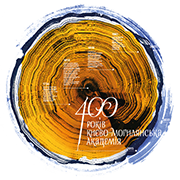News
Larysa Masenko presented her new book in the Kyiv-Mohyla Academy
- Details
- Published on Monday, 12 February 2018 12:46
Dr. Lasysa Masenko is a famous researcher of Ukrainian social linguistics, one of the leading specialists in the NASU Institute of Ukrainian Language, and a professor of two universities – Kyiv-Mohyla Academy and Borys Hrinchenko University. She is also an author of more then 300 scientific publications many of which she received different awards, and a head of the school of social linguistics.
The came to our Academy to share the results of the study she had being working on for several years – a monograph printed by Klio publishing house under the title The Language of Soviet Totalitarianism.
The first two chapters of this book are built around Dr. Masenko’s definition of the language of totalitarianism as the language of deception and terror. So, the first chapter explains the most prominent features of this specific language, and the second one is dedicated to the image of the enemy which makes one of the essential parts of it. The third chapter concentrates on the Ukrainian case in more details – here the author demonstrates national and social specifications of the linguistic situation here and discusses the impact the language of totalitarianism had on modern Ukrainian.
More details about the book may be found here
Here are the extracts from some of the reviews on this book:
“Today we’ve got this myth, that tells us “USSR was a good place to live in”. This myth is based on the one produced by the Soviet propaganda. And Larysa [Masenko] discovers what instruments, linguistic instruments, were used to construct this myth then.”
Prof. Liudmyla Dyka, PhD in Philology, Head of the Department of Ukrainian Language, Kyiv-Mohyla Academy
“We are leaving the distorted world [meaning the Soviet world], that world our linguists are studying when they take our language under research. The studies of language helps us to realize the distorted nature of that world.”
Dr. Stanislav Kul’chyts’kyi, Professor of History, the leading researcher of the Department of History of Ukraine in 20-30s of 20th century, NASU Institute of History of Ukraine
“For me this book is a warning, and also it is a great example of an easy and clear way to write about complicated matters.”
Prof. Oleksii Sinchenko, PhD in Philology, Professor of the Department of Comparative Literature, Borys Hrinchenko University
A report by Olesia Dalebiha, 2nd year Master student, Department of Philology; Strategic Development Center
